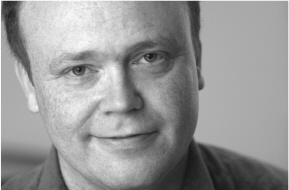Cupids (18 page)

He gives a long, sickly sigh, turns, and leaves. The door opens to animal shouts that soften only slightly as it clumps shut. To Bristol I will return, I tell myself, a duller man than I once hoped I would be, but one who has finally, and perhaps belatedly, relearned one lesson so easily lost in the byways and vicissitudes of experience and self-justifications. Tonight I remembered the difference between right and wrong.
EPILOGUE
Bartholomew
March 1613
H
IS ARMS PUSH BACK
, crooked at the elbow. His head rolls upon its wrinkled neck while my hands hover over him like hesitant doves. Sarah's own neat movements take over quickly, lifting the creature into her own chest, and moving him in a careful up-and-down dance. A spluttering moan, a protest perhaps, gives way to one long, rising note, which falls at last into that timeless rhythm of lament with which all women and men greet their entry into the world.
His eyes, almost closed like those of a bat, seem to open and stay upon me for just a second. His fight-fisted arms batter against Sarah's shoulder as the girl glides the baby down into Helen who lays spent, hair drenched with sweat, chest heaving with effort and pain, eyes moist with something other than this, and mouth puckering as though to receive a longed for succor. She looks at me too as her long fingers move over the translucent flesh of our newborn: it is the rarest of looks, one of those that link together a lifetime, making all that is lost in pain and confusion, all that is feared, no more terrible than a few wilted stalks in a chain of daisies. It is a look that says:
this is why we are here; we
will always remember this moment
.
It's the right time for both of us, I think, and the right time for the child. Providence breathed upon us yesterday, when Sarah's brother, Matthew, returned from the wharf, ax in his left hand, a sack dangling from his right. “The men from Cupers Cove have been looking for seals close by,” he mumbled in that way of his, as though words threatened to fetter the free running of his thoughts. Knowing the mistress of the cove was expecting, he told me, their womenfolk prepared something. My heart rolled a warning at the idea of a gift from Cupers Cove and I peered inside before taking it into Helen.
Indoors, the sackcloth whispered as together we drew the object out. A nest of finely interwoven twigs â more like something created by a giant bird than by the nimble fingers of women â was filled inside with smaller sacks of seeds: turnip, carrot, and pea. Helen held my eye, a slight smile playing upon her lips. I stroked her hand and moved outdoors.
Winter still crystallized the cove, hanging over the wharf rails and glistening on the dark hills and cliffs. But the sun was slowly warming the land. I could almost hear the movement of the roots and stems as they pushed through the earth and opened tongue-like buds of palest green. Light scattered over the waves that undulated like long stretches of fabric held at either end of a room and fluttered. In these movements I seemed to behold a perpetual, joyful dance of fin and tail. This, I found myself thinking, could indeed be a place of security, a place of love. At the very least, our time had come to live in faith.
I would like to thank publishers Garry Cranford, Margo Cranford, and Jerry Cranford for their belief in this novel, and everyone at Flanker Press for their positive ethos and attention to detail. Many thanks to editor Ed Kavanagh for sharing his insight and knowledge. My appreciation to The Newfoundland and Labrador Arts Council which supported this project with a writing grant. And thanks, as always, to my wife, Maura Hanrahan, and to my daughter Jemma to whom this book is quite fittingly dedicated.

PAUL BUTLER is the author of several critically acclaimed novels including
Hero
,
1892
,
NaGeira
,
Easton's Gold
,
Easton
, and
Stoker's
Shadow
. His work has appeared on the judges' lists for
Canada Reads
, the
Relit
longlist, and he was a winner in the
Government of Newfoundland and Labrador
Arts and Letters Awards
four times between 2003 and 2008. A graduate of Norman Jewison's Canadian Film Centre, Butler has written for the
Globe and Mail
,
The Beaver
,
Books in Canada
,
Atlantic Books Today
, and
Canadian Geographic
, and has also contributed to CBC Radio, local and national. He lives in St. John's.